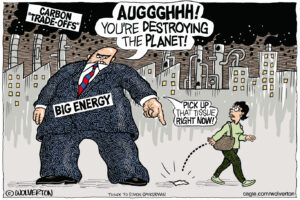National Climate Plan Insufficient to Avert Crisis
Among the most notable countries with lacking ambition are China and the United States. COP 27. UN Climate Change on Flickr
COP 27. UN Climate Change on Flickr
At last year’s United Nations climate summit in Glasgow, 193 governments promised to strengthen their national climate targets within one year. But only about two dozen of them have delivered on that promise, leaving civil society representatives wary of more empty promises and false solutions at the onset of COP 27.
“Signs of progress over the past year have moved the world away from the more catastrophic pathways it was on only a few years ago,” reports the Washington Post. “But as COP 27 begins, data show humanity remains on a perilous path.”
Not only are national emissions plans insufficient, but some proposed actions may even protect the status quo from a transformative move off fossil fuels. Referring to controversial technologies like carbon capture and blue hydrogen, that “You can’t tackle climate change by cheating,” Julia Levin, national climate program manager at Environmental Defence Canada, told a panel evaluating the initial wave of announcements over the first couple of days of the COP. “We cannot win the fight against climate change without getting off fossil fuels.”
To deliver meaningful progress, COP 27 must “close the door on these false solutions,” she added. “If governments, companies, and financial institutions don’t have a plan to phase out oil and gas production, they don’t have a plan to combat climate change. It’s that simple.”
The United Nations climate secretariat says national efforts to curb emissions are successfully slowing the rate of emissions. But so far, those efforts still have the world on track to warm about 2.5°C above pre-industrial levels by the end of this century, far above the 1.5°C target in the 2015 Paris agreement—which is itself now turning out to be acutely dangerous.
“With each fraction of a degree of warming, tens of millions more people worldwide would be exposed to life-threatening heat waves, food and water scarcity, and coastal flooding while millions more mammals, insects, birds, and plants would disappear,” writes the New York Times.
An assessment of nationally determined contributions (NDCs) that underpin the Paris Agreement’s goals paints another less-than-optimistic picture of climate progress. Analysis by the World Resources Institute (WRI) found that so far, NDCs across the globe have failed on all three fronts: limiting global warming to 1.5°C; promoting adaptation and resilience; and channeling funding toward low-carbon development.
Financing for climate adaptation and resilience is also proceeding slower than needed.
Compared to the initial commitments that countries drafted after the Paris agreement, “today’s NDCs are both significantly more ambitious than their predecessors and woefully inadequate to avert the climate crisis,” WRI says, pointing out that the world will miss its Paris goals “by a long shot” if the rate of improvement since 2016 continues.
“For the most part, the new and updated NDCs represent incremental improvement, when what is needed is transformational change,” WRI adds.
That’s because countries now convening in Egypt for COP 27 have largely failed to bring adequate plans to the table. Despite a year of increasingly severe impacts from climate change, and a growing body of science saying those impacts will worsen without appropriate action, a total of 172 countries have not updated their targets, says the Post.
“Disappointing” is how Claire Fyson, co-head of the climate policy team at Climate Analytics, described the lacklustre reality. “Few governments have really done anything to substantially move the dial.”
Among the most notable countries with lacking ambition are China and the United States, the world’s two biggest sources of carbon pollution. In fact, only one large emitter—Australia—has issued a plan that includes stronger commitments to cut emissions.
“But Australia came from a very, very low baseline,” said German climatologist Niklas Höhne. “They have a lot of catching up to do.”
Financing for climate adaptation and resilience is also proceeding slower than needed, as shown by the developed world’s 30 years of stalled promises to help vulnerable nations finance their response to climate impacts. While action is lacking, there has been a notable increased focus on the issue, as vulnerable nations repeat their demands for loss and damage payments.
Lorraine Chiponda, co-lead of the Don’t Gas Africa campaign and Africa Climate Movement-of-Movements coordinator, said this year’s COP must ensure that adaptation financing is directed to renewable infrastructure rather than a fossil fuel expansion. Chiponda noted a recent trend of African leaders moving to label gas as a clean energy source, and pointed to similar attempts by the European Union to reclassify both gas and nuclear power as green, despite the fossil industry’s overwhelming contribution to the climate crisis.
Chiponda said the drive to reframe carbon-based energy sources could lead to some countries—including ones in Africa—accepting false solutions in their climate strategies. That, in turn, would help some sectors misdirect UN climate negotiations.
She cautioned “that this COP might be a gas COP, given the large focus of financial institutions and governments on gas as a transition fuel.”
Your support matters…Independent journalism is under threat and overshadowed by heavily funded mainstream media.
You can help level the playing field. Become a member.
Your tax-deductible contribution keeps us digging beneath the headlines to give you thought-provoking, investigative reporting and analysis that unearths what's really happening- without compromise.
Give today to support our courageous, independent journalists.






You need to be a supporter to comment.
There are currently no responses to this article.
Be the first to respond.